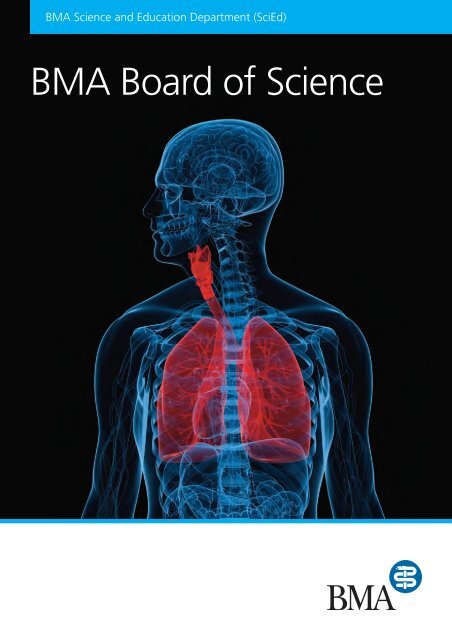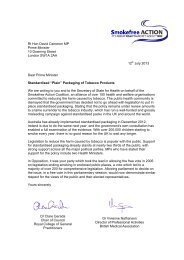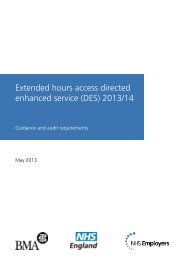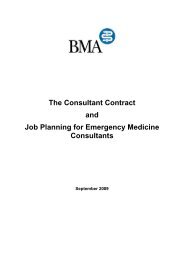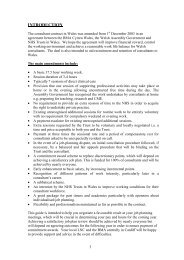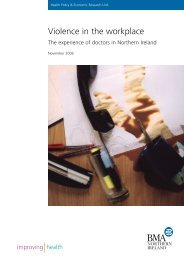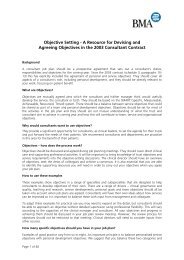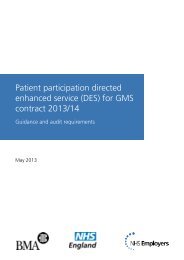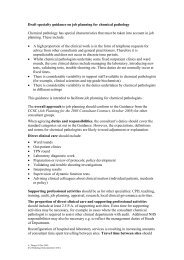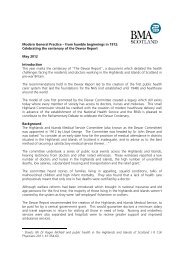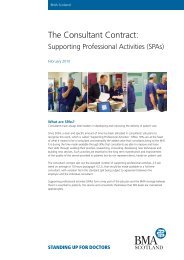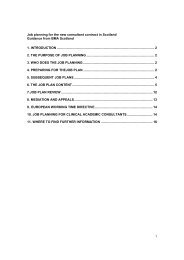BMA Board of Science
BMA Board of Science
BMA Board of Science
Create successful ePaper yourself
Turn your PDF publications into a flip-book with our unique Google optimized e-Paper software.
<strong>BMA</strong> <strong>Science</strong> and Education Department (SciEd)<br />
<strong>BMA</strong> <strong>Board</strong> <strong>of</strong> <strong>Science</strong>
<strong>BMA</strong> <strong>Board</strong> <strong>of</strong> <strong>Science</strong><br />
‘<br />
I did read with<br />
pleasure the 2008<br />
<strong>BMA</strong> publication<br />
about smoking<br />
imagery [Forever cool<br />
– the influence <strong>of</strong><br />
smoking imagery on<br />
young people].<br />
Congratulations to<br />
the <strong>BMA</strong> on such<br />
activities and on<br />
creating such perfect<br />
resources. I am sure<br />
also our colleagues in<br />
the Czech Republic<br />
will be happy to use<br />
the publication.<br />
’<br />
Eva Kralikova MD,<br />
PhD, Working Group<br />
for the Prevention<br />
and Treatment <strong>of</strong><br />
Tobacco Dependence,<br />
Czech Medical<br />
Association<br />
In treating individual patients, doctors are <strong>of</strong>ten unable to affect the<br />
underlying causes <strong>of</strong> the problems they see on a day-to-day basis. Raising<br />
awareness and health promotion can help tackle public health concerns<br />
before individual cases hit waiting rooms. Similarly, providing expert<br />
medical advice on relevant issues that affect the public makes an<br />
essential contribution to a healthier society. As the pr<strong>of</strong>essional<br />
organisation for doctors, the <strong>BMA</strong> is here to represent the collective voice<br />
and expertise <strong>of</strong> clinicians at these levels in all health-related matters.<br />
The work <strong>of</strong> the <strong>Board</strong> <strong>of</strong> <strong>Science</strong> (BoS) enables the <strong>BMA</strong> to publicise key<br />
medical evidence to a wide audience. Its broad remit allows it to be both<br />
reactive to issues that are <strong>of</strong> current public interest, and proactive in<br />
signposting potential areas <strong>of</strong> concern for the medical pr<strong>of</strong>ession. To<br />
date, the BoS has produced or commissioned work on a diverse range <strong>of</strong><br />
topics including smoking, road transport safety, climate change and<br />
alcohol misuse.<br />
The BoS supports and promotes medical science on behalf <strong>of</strong> <strong>BMA</strong><br />
members. By publishing evidence-based recommendations for action, it<br />
is able to advise and lobby governments on key issues that concern the<br />
medical pr<strong>of</strong>ession and impact on healthcare in the UK. Through this, it<br />
enables the <strong>BMA</strong> to inform and influence public health policy for the<br />
benefit <strong>of</strong> both clinicians and patients.<br />
The BoS has a purview <strong>of</strong> the work <strong>of</strong> the <strong>BMA</strong> Library, including its<br />
annual awards for medical books and patient information leaflets. The<br />
library is the busiest medical information service in the UK and specialises<br />
in current clinical practice, careers and pr<strong>of</strong>essional issues information.<br />
It has the UK’s best collection <strong>of</strong> medical DVDs and videos and the<br />
web-based Medline Plus electronic services never close. For further<br />
details, please contact the Library on 020 7383 6625 or email us at<br />
bma-library@bma.org.uk<br />
About 10 research grants totalling approximately £500,000 are awarded<br />
annually under the auspices <strong>of</strong> the BoS. These cover research areas from<br />
heart disease to schizophrenia. All research grants are funded by past<br />
bequests to the <strong>BMA</strong>. The aim <strong>of</strong> the grants is to fund high-quality,<br />
innovative research projects that are likely to benefit patients, population<br />
health and or healthcare. Further details on the <strong>BMA</strong> Research Grants<br />
can be obtained by emailing info.grants@bma.org.uk
To sign up for alerts from the <strong>Board</strong> register at www.bma.org.uk<br />
Chairman <strong>of</strong> the <strong>BMA</strong> <strong>Board</strong> <strong>of</strong> <strong>Science</strong>:<br />
Pr<strong>of</strong>essor Averil Mansfield CBE, FRCS, FACS<br />
A former President <strong>of</strong> the <strong>BMA</strong>, Pr<strong>of</strong>essor Averil Mansfield was appointed<br />
Chairman <strong>of</strong> the <strong>Board</strong> in 2010. In a career that has spanned both clinical<br />
and pr<strong>of</strong>essional appointments, Pr<strong>of</strong>essor Mansfield served as Director <strong>of</strong><br />
The Academic Surgical Unit at St Mary’s Hospital, Imperial College<br />
London, where she became the first female Pr<strong>of</strong>essor <strong>of</strong> Surgery in the<br />
UK. She was Vice President <strong>of</strong> the Royal College <strong>of</strong> Surgeons <strong>of</strong> England<br />
from 1998 to 2000 and Chairman <strong>of</strong> the Stroke Association from 2003 to<br />
2008. Pr<strong>of</strong>essor Mansfield was awarded a CBE in 1998 for services to<br />
Surgery and to Women in Medicine.<br />
‘<br />
The <strong>BMA</strong> report ‘Fetal alcohol spectrum<br />
disorders – a guide for healthcare pr<strong>of</strong>essionals’<br />
is the first report <strong>of</strong> its kind in the UK. It has<br />
stimulated unprecedented interest in FASD in<br />
the media, and more importantly in the<br />
medical world. Ultimately it is medical<br />
pr<strong>of</strong>essionals who will change lives in<br />
preventing these disorders and helping those<br />
living with FASD. In light <strong>of</strong> this report, we have<br />
received accolades from colleagues at the CDC<br />
[Centers for Disease Prevention and Control],<br />
the NIAAA [National Institute on Alcohol Abuse<br />
and Alcoholism], and doctors in Canada, the<br />
USA, Australia, New Zealand, South Africa and<br />
several European Countries. The <strong>BMA</strong> report<br />
has achieved what we as a charity have been<br />
striving to do for the past six years. The report<br />
will help educate the public, prevent many<br />
children from being born with FASD out <strong>of</strong><br />
ignorance, and raise the pr<strong>of</strong>ile <strong>of</strong> FASD so<br />
schools, social services and support<br />
organisations recognise this disability and<br />
develop appropriate services.<br />
’<br />
Susan Fleisher, Executive Director, National<br />
Organisation For Fetal Alcohol Syndrome-UK<br />
(NOFAS-UK)<br />
‘<br />
The <strong>BMA</strong> <strong>Board</strong> <strong>of</strong> <strong>Science</strong> report is an<br />
extremely useful resource for those<br />
directly involved with FASD cases in the<br />
UK and internationally. It provides a<br />
comprehensive overview <strong>of</strong> the subject<br />
area and is an excellent reference<br />
document to provide to others seeking<br />
more information about FASD.<br />
’<br />
Dr Raja Mukherjee, Consultant<br />
Psychiatrist for people with learning<br />
disabilities, Surrey and Borders<br />
Partnership NHS Foundation Trust
Smoking: BoS impact and influence<br />
Pr<strong>of</strong>essor Richard Doll and his mentor Pr<strong>of</strong>essor Sir Austin Bradford Hill first established the link<br />
between smoking and lung cancer in research findings published in the British Medical Journal in<br />
1950. Over the next 50 years, collaborating with both Bradford Hill and later Sir Richard Peto, Doll’s<br />
groundbreaking study <strong>of</strong> British doctors would show that smoking not only caused lung cancer but<br />
also heart disease and peptic ulcers. Working with the International Agency for Research on Cancer,<br />
he helped identify passive and second-hand smoke as carcinogenic to humans.<br />
Throughout this time, the <strong>BMA</strong> publicised the public health implications <strong>of</strong> these findings. In<br />
1984, the <strong>BMA</strong> and its <strong>Board</strong> <strong>of</strong> <strong>Science</strong> launched a major anti-smoking campaign. The <strong>Board</strong><br />
<strong>of</strong> <strong>Science</strong> has since published influential research and evidence-based recommendations on<br />
the use and advertisement <strong>of</strong> tobacco products. These publications have had a major impact<br />
on government health policy and the implementation <strong>of</strong> tobacco legislation in the UK.<br />
March 1984 <strong>BMA</strong> launches major antismoking<br />
campaign<br />
1985 • Cigarette advertising and<br />
smoking: a review <strong>of</strong><br />
the evidence<br />
• When smoke gets in<br />
your eyes<br />
March 1986 New voluntary agreement on<br />
tobacco advertising and<br />
promotion reached<br />
April 1986 Protection <strong>of</strong> Children<br />
(Tobacco) Act 1986 passed<br />
July 1989 <strong>BMA</strong> policy for a ban against<br />
smoking in public places<br />
affirmed<br />
2002-04 • Towards smoke-free<br />
public places<br />
• Smoking and<br />
reproductive life: the<br />
impact <strong>of</strong> smoking on<br />
sexual, reproductive and<br />
child health<br />
Feb 2006 Ban on smoking in public<br />
places passes Parliament, starts<br />
1 July 2007<br />
2007-08 • Breaking the cycle <strong>of</strong><br />
children’s exposure to<br />
tobacco smoke<br />
• Forever cool: the<br />
influence <strong>of</strong> smoking<br />
imagery on young people<br />
Nov 2009 Government passes The Health<br />
Act 2009 including provisions<br />
to ban point <strong>of</strong> sale advertising<br />
and the sale <strong>of</strong> tobacco from<br />
vending machines
For further information on the <strong>Board</strong>’s work and to sign up<br />
for updates please see www.bma.org.uk
Road safety: BoS impact and influence<br />
The <strong>BMA</strong> has actively campaigned on road safety issues for many years. Through its <strong>Board</strong> <strong>of</strong><br />
<strong>Science</strong>, it has formed policy, lobbied governments and produced guidance on issues including<br />
drink and drug driving, speeding and the use <strong>of</strong> mobile phones while at the wheel.<br />
While measures such as anti-lock breaking systems, air bags, and side and front impact protection<br />
have significantly improved road safety, the use <strong>of</strong> seat belts remains one <strong>of</strong> the most important<br />
preventative measures for protecting drivers and passengers. Since 1973, the <strong>BMA</strong> has been at the<br />
forefront <strong>of</strong> campaigns to promote the importance <strong>of</strong> wearing seat belts and was instrumental in<br />
lobbying the government to introduce legislation making seat belt usage compulsory for all drivers<br />
and all passengers.<br />
1965 It becomes compulsory for<br />
manufacturers to fit seat belts in the<br />
front <strong>of</strong> all new cars, although<br />
wearing them remains voluntary for<br />
drivers and passengers.<br />
1972 A television commercial starring Jimmy<br />
Saville that encouraged drivers to wear<br />
a seat belt is broadcast for the first<br />
time. Its memorable strap-line, ‘Clunk,<br />
clink, every trip’, features in similar<br />
adverts until 1993.<br />
1973 At its Annual Representative Meeting<br />
(ARM), the <strong>BMA</strong> affirms its policy that<br />
the wearing <strong>of</strong> seat belts should be<br />
compulsory for drivers and front seat<br />
passengers in cars and light vans.<br />
Over the next 10 years the <strong>BMA</strong>, with<br />
other key stakeholders like the police<br />
and the Royal Society for the Prevention<br />
<strong>of</strong> Accidents, campaigned and lobbied<br />
the government on the introduction <strong>of</strong><br />
compulsory seat belt legislation.<br />
1984 After the success over front seat<br />
legislation, the <strong>BMA</strong> affirms policy, put<br />
forward by the <strong>Board</strong> <strong>of</strong> <strong>Science</strong>, to<br />
campaign for the compulsory fitting<br />
and wearing <strong>of</strong> seat belts in all new cars<br />
and the middle seat in multi-purpose<br />
vehicles.<br />
1983 The Transport Act 1983 passes<br />
Parliament making it compulsory to<br />
wear a seat belt in the front seats <strong>of</strong><br />
cars where one was fitted. Prior to the<br />
introduction <strong>of</strong> the Act, roughly half <strong>of</strong><br />
all drivers and front seat passengers<br />
voluntarily chose to wear seat belts.<br />
After the Act, the proportion wearing<br />
seat belts rose to 93%.<br />
1989 It becomes compulsory for children to<br />
wear seat belts in the rear <strong>of</strong> the car.<br />
1991 Legislation on wearing seat belts in the<br />
back <strong>of</strong> cars is extended to adults.
The <strong>BMA</strong> <strong>Science</strong> and Education Department (SciEd)<br />
The pr<strong>of</strong>essional work <strong>of</strong> the <strong>BMA</strong> is<br />
managed through the Directorate <strong>of</strong><br />
Pr<strong>of</strong>essional Activities and its <strong>Board</strong>. The work<br />
we do is designed to make it easier for<br />
doctors to get on with being the best doctors<br />
they can be, providing excellence in care to<br />
their patients and through health<br />
promotion/ill-health protection to the<br />
population at large.<br />
SciEd sits within the Directorate <strong>of</strong><br />
Pr<strong>of</strong>essional Activities and is responsible for<br />
managing the following areas:<br />
• <strong>Board</strong> <strong>of</strong> <strong>Science</strong><br />
• Equality and Diversity Committee<br />
• Patient Liaison Group<br />
• <strong>BMA</strong> Research Grants<br />
Our committees maintain an influential role in<br />
forming public and government opinion on a<br />
range <strong>of</strong> health-related topics. We analyse<br />
and review critical matters <strong>of</strong> interest to the<br />
pr<strong>of</strong>ession, and to the public, and seek to<br />
influence government policy makers with<br />
evidence-based recommendations for action.<br />
We monitor government legislation and<br />
consultations, and lobby for changes to<br />
address inequalities in health and healthcare,<br />
as well as doctors’ training and career<br />
opportunities.<br />
We produce information resources and<br />
guidance notes for members and every year<br />
we award grants under the auspice <strong>of</strong> the<br />
<strong>Board</strong> <strong>of</strong> <strong>Science</strong> for ongoing or prospective<br />
medical research.<br />
1 Policy reports are usually available as PDF<br />
files on the <strong>BMA</strong> website and published<br />
hard copy.<br />
1 Information resources and guidance for<br />
members are primarily web-based and<br />
include extensive signposting to other<br />
sources <strong>of</strong> information.<br />
How to contact us<br />
<strong>Science</strong> and Education Department<br />
British Medical Association<br />
<strong>BMA</strong> House Tavistock Square<br />
London WC1H 9JP<br />
Tel: 020 7874 7018<br />
Email: info.science@bma.org.uk<br />
www.bma.org.uk
The <strong>BMA</strong> is committed to protecting the environment by using<br />
papers that contain a high percentage <strong>of</strong> recycled fibre or those<br />
approved by the Forestry Stewardship Council (FSC) label that<br />
guarantees the harvested trees are replaced or are allowed to<br />
regenerate naturally. When you have finished with this<br />
publication, please recycle it responsibly.<br />
Issued by the British Medical Association, <strong>BMA</strong> House, Tavistock Square, London, WC1H 9JP<br />
© British Medical Association, 2010


